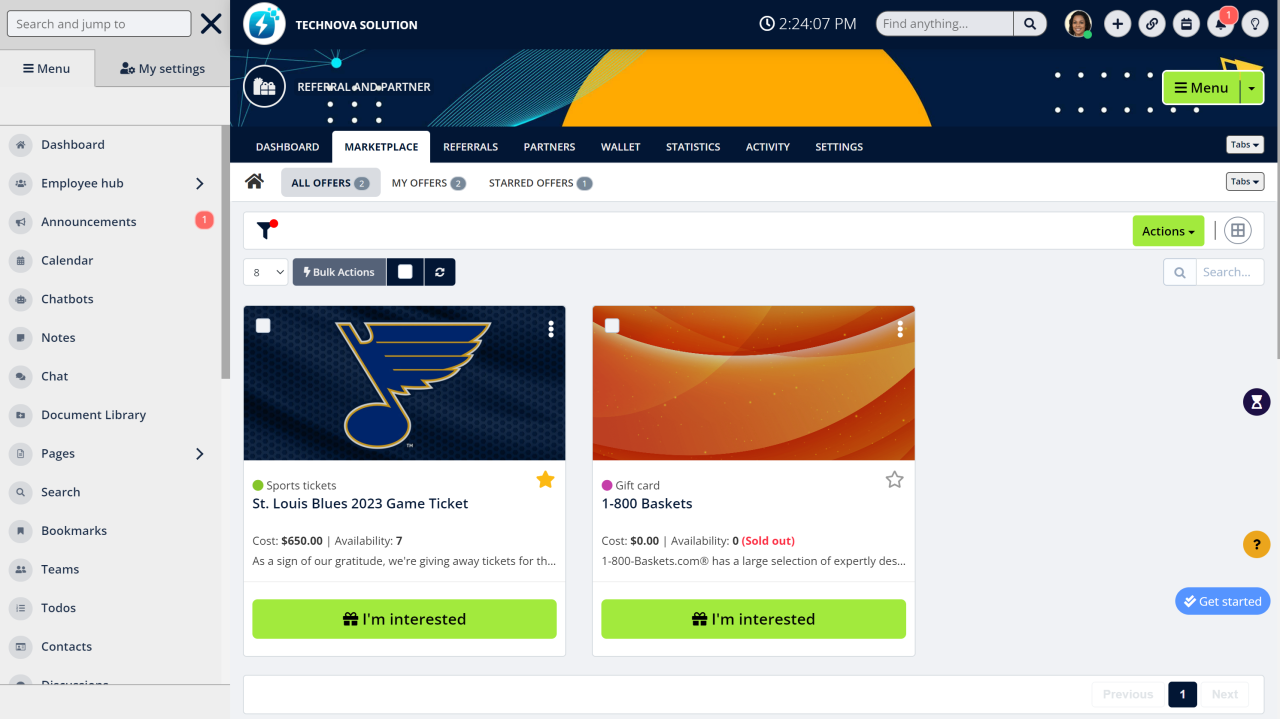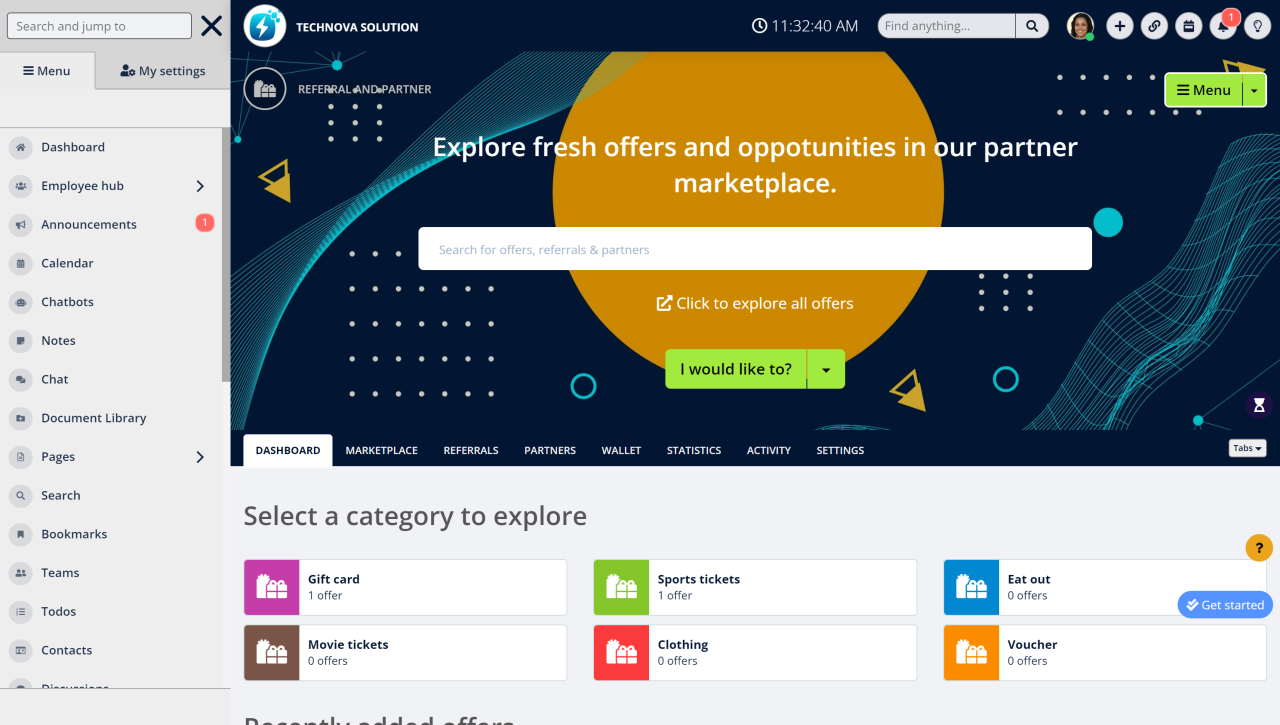Insight Blog
Agility’s perspectives on transforming the employee's experience throughout remote transformation using connected enterprise tools.
14 minutes reading time
(2851 words)
The Art of the Referral: 2023 Complete Guide
Why not transform your customer relationships into official referral partnerships? Discover what referral partners entail, how they differ from other channel partnerships, and the crucial steps for establishing a prosperous referral partnership.
Have you ever contemplated the possibility that when you allocate resources to acquire customer referrals, you could potentially be targeting individuals with whom you already have connections or those accessible through your colleagues' networks?
Referral marketing boasts impressive statistics: it delivers 3-5 times higher conversion rates than any other marketing channel, results in a 25% higher profit margin from referred customers, fosters 18% greater customer loyalty compared to other acquisition methods, and encourages referred customers to be 4 times more likely to refer others to your brand.
This guide explores how you can leverage partner referrals to strengthen your new business endeavors with the support of your coworkers and business partners.
Referral marketing in the digital marketing in 2023
Referral marketing in the digital marketing arena has emerged as a powerful strategy to harness the influence of satisfied customers and advocates. In this digital age, word-of-mouth marketing has transformed into a dynamic and scalable approach, thanks to the proliferation of social media and online platforms.
One of the key benefits of referral marketing in the digital space is its ability to reach a wide and highly targeted audience.
Customers can easily share their positive experiences with friends, family, and colleagues through various digital channels, amplifying the reach of your brand and products. Social media platforms, email, and messaging apps serve as ideal conduits for these referrals, enabling swift and widespread dissemination of information.
Moreover, the trust factor plays a pivotal role in digital referral marketing. People tend to trust recommendations from their peers or trusted sources more than traditional advertising.
Positive reviews, social proof, and personal endorsements from existing customers can significantly influence the purchasing decisions of potential buyers. In essence, referral marketing capitalizes on the authenticity and credibility of these recommendations.
Tracking and analytics tools have become indispensable in the digital marketing landscape, and referral marketing is no exception.
Businesses can now track the performance of their referral programs with precision, monitoring metrics such as conversion rates, customer acquisition costs, and the lifetime value of referred customers.
This data-driven approach enables marketers to optimize their referral strategies continually, ensuring maximum return on investment.
Referral marketing in the digital era has evolved into a dynamic and influential force, leveraging the vast digital landscape to reach and engage with a broad audience while capitalizing on trust, authenticity, and data-driven insights.
When executed effectively, it can be a game-changer for businesses looking to expand their customer base and boost brand advocacy in the online realm.
What is Affiliate Marketing?
Affiliate marketing is a digital advertising concept that revolves around a partnership between two parties: one who owns a product and the other who facilitates its promotion. In this arrangement, when the promotional efforts result in sales or desired actions, the product owner compensates the publisher.
The compensation structure in affiliate marketing can take various forms. It might involve paying the affiliate a percentage of each sale or a fixed fee. Some affiliate programs opt for one-time payments for successful referrals, while others prefer recurring monthly payouts.
The compensation structure in affiliate marketing can take various forms. It might involve paying the affiliate a percentage of each sale or a fixed fee. Some affiliate programs opt for one-time payments for successful referrals, while others prefer recurring monthly payouts.
The choice often depends on the nature of the product and the size of the brand involved.
In essence, affiliate marketing shares similarities with referral marketing, as both involve referring potential customers to a business. However, affiliate marketing differs in that it typically operates as a structured business relationship rather than a casual recommendation.
In essence, affiliate marketing shares similarities with referral marketing, as both involve referring potential customers to a business. However, affiliate marketing differs in that it typically operates as a structured business relationship rather than a casual recommendation.
The digital landscape has propelled affiliate marketing into a billion-dollar industry due to its simplicity. Vendors provide affiliates with unique tracking links that include tracking pixels.
These technologies enable the monitoring of user actions and conversions, allowing businesses to precisely measure the effectiveness of their affiliate marketing efforts.
This streamlined approach has contributed to the widespread adoption of affiliate marketing in the digital realm.
What is Referral Marketing?
Referral marketing is a strategy in which businesses encourage their existing customers or contacts to recommend their products or services to others. It relies on word-of-mouth recommendations and leverages the trust and credibility of satisfied customers or advocates to attract new customers.
In a referral marketing program, existing customers, often referred to as "referrers" or "advocates," are incentivized to refer friends, family, colleagues, or acquaintances to the business.
In a referral marketing program, existing customers, often referred to as "referrers" or "advocates," are incentivized to refer friends, family, colleagues, or acquaintances to the business.
When these referrals make a purchase or take a desired action (such as signing up for a service), both the referrer and the new customer typically receive some form of reward or benefit. This reward system motivates customers to actively promote the business to their network, leading to increased brand awareness, customer acquisition, and revenue.
Referral marketing is effective because it leverages the power of trust and social proof. People tend to trust recommendations from friends, family, or respected sources more than traditional advertising.
As a result, referral marketing can help businesses expand their customer base, increase sales, and build stronger relationships with their existing customers.
What is a referral partner?
A referral partner is an individual or business that voluntarily recommends your brand to their acquaintances.
These close associates of your business advocate for your products or services among people they have established relationships with, all in exchange for rewards.Referral partnerships fall under the category of channel partnerships. Although the structure of referral partnerships may resemble that of customer referral programs, they tend to be more formal in nature.
Similar to many other channel partnerships, referral partnerships typically commence with a formal and comprehensive agreement between your business and the partner. This agreement outlines the partner's commitment to promoting your products or services to potential customers.
In recognition of their efforts, each time a referral partner successfully brings in a new sale for your business, they receive a commission, commonly known as a referral fee, as a token of appreciation.
Follow us and access great exclusive content everyday: Follow us on Google News
Differences between Affiliate and Referral Marketing
Affiliate marketing and referral marketing are two distinct strategies used by businesses to acquire new customers and promote products or services. Here are the key differences between the two:
1. Nature of Relationship:
2.Compensation Structure:
3.Promotion Channels:
4.Trust and Authenticity:
5. Measurement and Tracking:
1. Nature of Relationship:
- Affiliate Marketing: In affiliate marketing, the relationship between the product/service owner and the affiliate is typically a formal, contractual arrangement. Affiliates are often individuals or businesses who sign up for affiliate programs and are compensated for their marketing efforts based on agreed-upon terms, such as commissions or flat fees.
- Referral Marketing: Referral marketing is often more informal and relies on personal recommendations from satisfied customers. It is based on trust and word-of-mouth. Referrers (existing customers or advocates) voluntarily promote the product or service without a formal contract or structured compensation plan.
2.Compensation Structure:
- Affiliate Marketing: Affiliates are compensated based on specific actions, such as sales, leads, or clicks, as outlined in the affiliate program's terms. Compensation can be in the form of commissions, flat fees, or other incentives.
- Referral Marketing: Referrers in referral marketing are typically not compensated monetarily. Instead, they may receive non-financial rewards, such as discounts, free products, or special recognition for successful referrals. The motivation is often based on loyalty and the desire to help others.
3.Promotion Channels:
- Affiliate Marketing: Affiliates often promote products or services through various digital channels, including websites, blogs, social media, email marketing, and online advertising. The focus is on reaching a broader audience.
- Referral Marketing: Referral marketing relies heavily on personal relationships and recommendations. Referrers share their positive experiences directly with friends, family, or acquaintances through word of mouth, in-person conversations, or social interactions.
4.Trust and Authenticity:
- Affiliate Marketing: While affiliate marketing can be effective, it may sometimes lack the personal touch and trust associated with referrals. Customers may be aware that affiliates are financially motivated to make recommendations.
- Referral Marketing: Referral marketing capitalizes on the strong trust that exists within personal networks. Recommendations from friends and family carry a high level of authenticity and credibility, often resulting in higher conversion rates.
5. Measurement and Tracking:
- Affiliate Marketing: Affiliate marketing relies on advanced tracking technologies, such as tracking pixels and unique affiliate links, to monitor user behavior and conversions accurately. Data-driven metrics are often used to assess performance.
- Referral Marketing: Referral marketing may have less sophisticated tracking mechanisms, relying more on anecdotal evidence and customer feedback to measure the impact of referrals.
While both affiliate and referral marketing aim to drive business growth through customer recommendations, they differ in terms of their formality, compensation structures, promotion channels, trust factors, and measurement methods. The choice between the two strategies depends on a business's specific goals, target audience, and preferred marketing approach.
Referral partnerships vs. Affiliate partnerships
Affiliate marketing partnerships share many similarities with referral partnerships, primarily involving the generation of sales in exchange for cash commissions.
However, affiliate partners primarily function as content creators, such as bloggers or podcasters. They leverage their own platforms, which could be blogs, websites, or social media profiles, to promote your products or services to their extensive follower base.
In most cases, affiliates lack personal familiarity with their audience members. At times, they may not have direct experience with your product or service.
While affiliate partners may reach a broader audience than referral partners, they often lack the personal rapport that referral partners have with potential leads. Additionally, affiliates may not possess authentic experiences with your brand.
Consequently, leads generated by affiliates can sometimes be of lower quality or may require more time to convert compared to those brought in by referral partners.
Nevertheless, affiliate partners frequently generate a larger volume of leads than referral partners.
The benefits of referral programs
Referral programs offer a range of advantages for businesses and customers alike.
Here are some key benefits:
- Cost-Effective Customer Acquisition: Referral programs are a cost-effective way to acquire new customers. Instead of spending significant amounts on advertising and marketing campaigns, you rely on your existing customers to refer new ones, often with minimal or no monetary incentives.
- Higher-Quality Leads: Referred customers tend to be of higher quality. When someone refers a friend or family member, they are more likely to be genuinely interested in your products or services, resulting in a higher conversion rate.
- Increased Sales: Referral programs can lead to a significant increase in sales. People tend to trust recommendations from friends and family, making referred customers more likely to make a purchase.
- Enhanced Customer Loyalty: Customers who participate in referral programs often feel more engaged and loyal to your brand. They become advocates, strengthening their relationship with your company.
- Wider Reach: Referral programs can expand your reach to new customer segments. Referrers bring in individuals from their own networks, helping you access markets you might not have reached otherwise.
- Improved Conversion Rates: Referred leads typically have higher conversion rates compared to cold leads. They are already predisposed to trust your business due to the recommendation, making them more likely to convert into paying customers.
- Data-Driven Insights: Many referral programs come with tracking and analytics features. This data helps you measure the success of your program, identify top referrers, and understand which strategies are most effective for generating referrals.
- Positive Brand Image: Effective referral programs can enhance your brand's reputation. When customers refer others to your business, it signals that your products or services are worth recommending.
- Reduced Churn: Referred customers tend to stay loyal for longer, reducing customer churn rates. This can lead to increased customer lifetime value and higher revenue.
- Employee Engagement: Internal referral programs can also boost employee engagement. When employees are incentivized to refer potential hires, it can lead to a more engaged and connected workforce.
- Scalability: Referral programs are scalable. As your business grows, you can adapt and expand your program to accommodate a larger customer base.
- Competitive Advantage: Having a well-implemented referral program can set you apart from competitors who may not have such initiatives in place.
In summary, referral programs offer a wide range of benefits, including cost-effective customer acquisition, increased sales, improved customer loyalty, and valuable data insights. When executed effectively, they can be a powerful tool for driving business growth and building a strong customer base.
You may also like: Best Apps for Employees: UPDATED 2022 – A Complete Guide
Why do you need a referral program?
92% consumers trust referrals or recommendations from people they personally know. Source: FinancesOnline
In today's era of social media dominance, businesses recognize the significance of word-of-mouth marketing.
However, many struggle to gauge its impact or stimulate its occurrence.
When you integrate a referral program into a solid foundation, word-of-mouth has the potential to soar and become quantifiable. This is because a referral program actively encourages sharing and simplifies the process. In fact, numerous referral marketing platforms offer user-friendly sharing buttons for customers and enable businesses to establish tailored messaging, thus streamlining the sharing process.
Furthermore, a referral program renders word-of-mouth marketing traceable. Referral program systems meticulously track each interaction, providing a convenient means to measure your referral analytics.
This, in turn, offers an effortless way to discern the most effective methods for attracting leads to your business.
Referral marketing ideas and tips
Managing a referral rewards program doesn't need to be complex, and there are no hidden secrets to its success. Here are three practical ideas to ensure the smooth operation of your referral program:
1. Utilize Referral Program Software:
While not mandatory, employing referral program software can greatly simplify your efforts. By using software, you streamline your processes, facilitate seamless integration, and enable automation. This choice is particularly valuable for maintaining a consistent program appearance and rapidly accumulating referrals through a plug-and-play solution.
2. Select the Appropriate Reward:
Recognize that not all rewards will equally motivate your customers. It might require some experimentation to identify the most compelling incentive, and that's perfectly fine. Taking the time to pinpoint the ideal reward has the potential to inspire a substantial number of referrals. Even if your business is outstanding, the reward you offer can be the deciding factor in enticing customers through affiliate programs.
3. Consistently Promote the Referral Program:
Remember that a referral program is essentially a marketing campaign. As with any marketing effort, it's crucial to promote it across various marketing channels. Referrals can be a powerful driver of growth, but if you keep your referral program hidden, you won't witness the growth potential it offers.
Incorporating these strategies can help ensure the effectiveness and efficiency of your referral rewards program.
Affiliate Management in AgilityPortal for marketing on another level!
Marketing is an indispensable aspect of any business, crucial for delivering better products to customers. There exist various techniques for marketing in different types of businesses, but the key lies in choosing the right one at the appropriate time.
Speaking of the most fitting marketing strategy, one cannot overlook affiliate management. According to big-commerce, a staggering 81% of brands and 84% of publishers harness the potential of affiliate marketing. Affiliate marketing is a performance-based approach where one or more affiliates are rewarded for each visitor or customer acquired through their marketing efforts.
Speaking of the most fitting marketing strategy, one cannot overlook affiliate management. According to big-commerce, a staggering 81% of brands and 84% of publishers harness the potential of affiliate marketing. Affiliate marketing is a performance-based approach where one or more affiliates are rewarded for each visitor or customer acquired through their marketing efforts.
Now, managing affiliates and partners has become effortless with AgilityPortal. AgilityPortal Affiliate Management empowers you to effortlessly establish and oversee an Affiliate Program within the AgilityPortal platform.
You can easily enroll partners through AgilityPortal's extranet, allowing partners to seamlessly handle the entire process of referring customers and receive rewards as tokens of appreciation.
When you align your business with affiliates, you tap into a collective pool of creative minds, each dedicated to promoting your products in their unique ways.
Furthermore, the enticing rewards provided for successful sales serve as a powerful incentive for affiliates to attract as many customers as possible to your business. This, in turn, becomes a significant catalyst for your business's growth.
It's essential to carefully select and collaborate with affiliates whose content and interests align with your website's theme.
By leveraging the persuasive power of recommendations, you can channel your efforts into targeted marketing strategies rather than relying on broad, paid advertising approaches.
Free ebook: How To Get Your Intranet Off The Ground
Wrapping up
In conclusion, if you've determined that referral partnerships align with your business goals, consider these key steps for success: carefully select customers with robust networks, establish clear expectations through a referral partner agreement, ensure thorough partner training on your brand's value, offer enticing incentives for sales contributions, and maintain regular communication.
To streamline and optimize your partnership management, the right Partner Relationship Management (PRM) software is essential.Explore the capabilities of our flexible referral marketing software, which can be tailored to your specific business requirements.
It enables efficient management, tracking, and incentivization of referral partnerships, ensuring a seamless and productive collaboration.
Book a demo of our employee app today to see how you can build your very own Enterprise Social Network, and keep all employees engaged in one place.
Categories
Blog
(2696)
Business Management
(331)
Employee Engagement
(213)
Digital Transformation
(182)
Growth
(122)
Intranets
(120)
Remote Work
(61)
Sales
(48)
Collaboration
(41)
Culture
(29)
Project management
(29)
Customer Experience
(26)
Knowledge Management
(21)
Leadership
(20)
Comparisons
(8)
News
(1)
Ready to learn more? 👍
One platform to optimize, manage and track all of your teams. Your new digital workplace is a click away. 🚀
Free for 14 days, no credit card required.

















